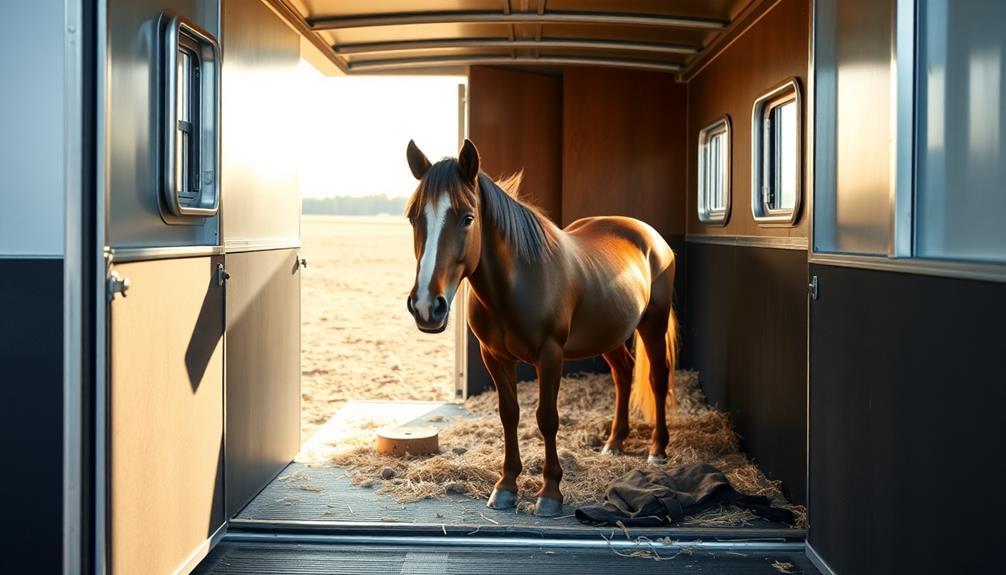Transporting a mini horse safely requires thorough preparation. Start with a veterinary check-up to guarantee good health and obtain necessary health certificates. Consistently feed your horse to reduce stress, and pack essentials like hay, water, and a first aid kit. Modify your trailer for safety, using secure dividers and stable flooring. During travel, check on your horse regularly and schedule breaks every few hours for hydration and stretching. After arriving, give your mini horse time to adjust and monitor its behavior. By following these tips, you can guarantee a smoother journey for your equine friend, and there's more useful information ahead.
Key Takeaways
- Schedule a veterinary check-up and obtain health certificates prior to travel to ensure your mini horse's health and compliance with regulations.
- Use a quality trailer designed for mini horses and secure dividers to prevent shifting during transport.
- Employ loose hauling methods for short trips, allowing natural movement while monitoring for signs of stress or discomfort.
- Take regular breaks every 3-4 hours for hydration and stretching, maintaining a calm environment during travel.
- Allow 1-3 days for acclimatization at the destination, monitoring eating and behavior to ensure a smooth transition.
Preparing for the Journey
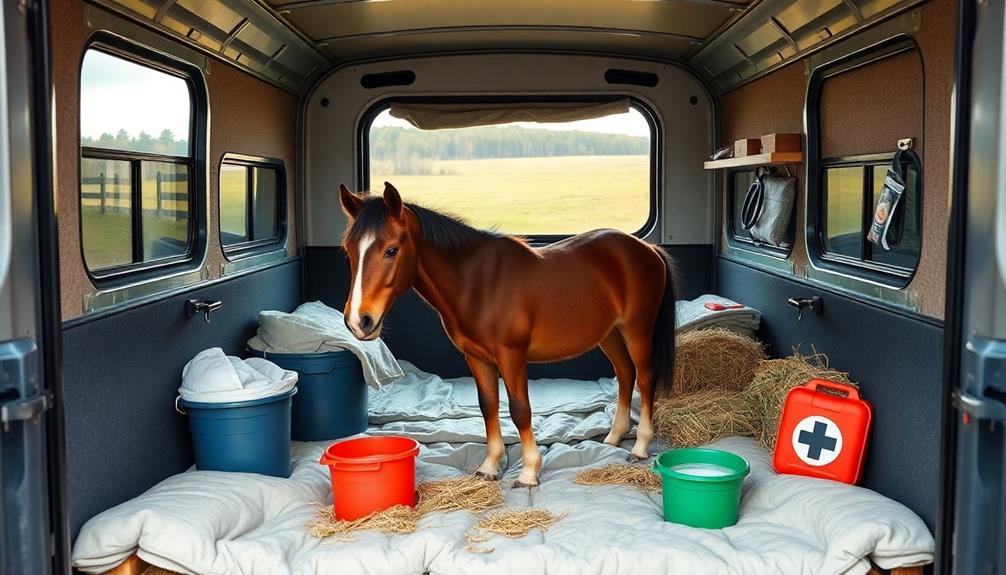
Preparing for the journey with your mini horse is vital to guarantee a smooth and stress-free experience. Start by scheduling a veterinary check-up 1-2 weeks before travel. This confirms your miniature horse is healthy and vaccinations, like EHV-1 and West Nile Virus, are up to date.
Don't forget to obtain health certificates, especially if you're crossing state lines, as these may be required.
Next, pack your essential supplies. Bring enough feed, hay, and water to keep your mini horse well-nourished and hydrated throughout the journey. A first aid kit is also important in case of any unexpected incidents.
Planning your travel route is just as significant. Aim for regular rest stops every three to four hours to let your mini horse stretch, hydrate, and relieve stress. These breaks help maintain your horse's comfort and well-being during the trip.
Trailer Modifications and Setup
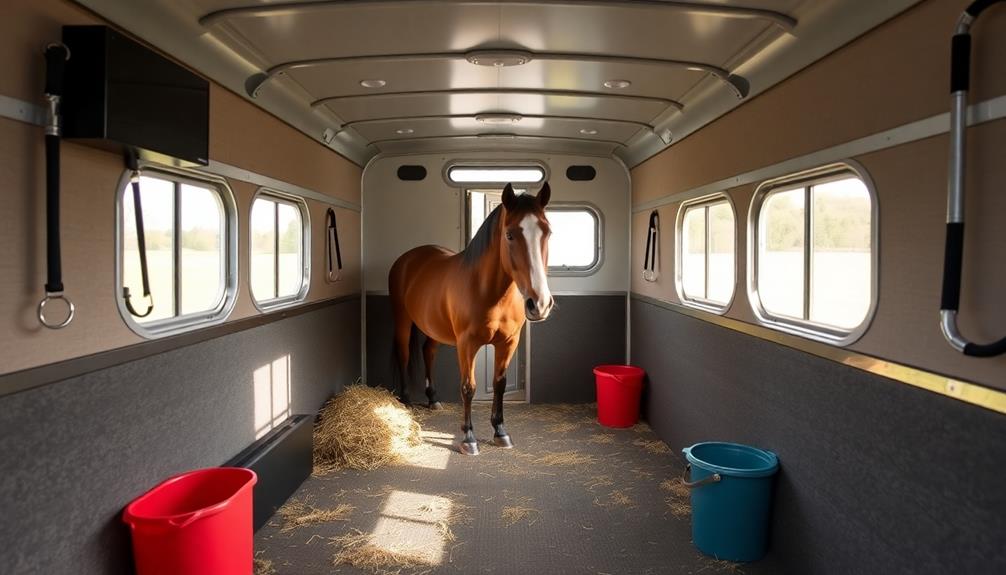
To guarantee a safe and comfortable journey for your mini horse, modifying and setting up your trailer correctly is essential.
Start by considering the dividers in your trailer. Using plywood to extend these dividers to the floor helps keep your mini horses secure and prevents them from escaping underneath during transport. Make sure to secure the plywood extensions to the trailer walls with two by fours, making certain they don't block any emergency exits.
Next, focus on the flooring. Heavy-duty zip ties are your best bet for securing stall mats, providing stability and safety for your mini horses while traveling. Additionally, placing bales of hay can help prevent smaller horses from slipping under the dividers, reducing the risk of injury.
Lastly, make certain the trailer setup allows for easy loading and unloading. A smooth process minimizes stress for both you and your mini horse.
Safe Hauling Methods

After guaranteeing your trailer is set up for safety, it's time to focus on safe hauling methods for your mini horse. When transporting, consider using a stock or straight load horse trailer and allow your mini horse to move around a bit. This loose hauling can reduce stress but be cautious to prevent potential issues.
If you decide to tie your horse, use slip ties with long leads to allow some movement while minimizing the risk of entanglement. Make certain to secure dividers in the trailer and use bale twine to prevent your mini horse from going under them during transit.
Position tie loops lower to accommodate their size, guaranteeing a comfortable and safe position. While on the road, keep an eye out for signs of stress, like excessive sweating or pawing.
It's vital to monitor your horse regularly and provide water every few hours to keep them hydrated. Don't forget to stop for breaks to check on their well-being and address any signs of distress.
With these safe hauling methods, you'll help guarantee a smooth and stress-free journey for your mini horse.
Monitoring Comfort During Travel

While you're on the road, it's crucial to monitor your mini horse's comfort to guarantee a smooth journey. Regularly check on your horse's behavior and health during transit. Look for any signs of distress or discomfort so you can address issues early.
Providing adequate bedding and hay will enhance their comfort and help reduce stress levels.
Schedule rest stops every three to four hours. These breaks allow your mini horse to stretch, hydrate, and assess their overall well-being. At each stop, offer water and closely monitor their drinking habits; hydration is key to preventing dehydration during travel.
Maintaining a calm environment within the trailer is equally important. Stress can be heightened by noise, sudden movements, or unfamiliar surroundings, so try to minimize these factors.
Speak softly and stay composed, as your demeanor can affect your horse's comfort.
Health Considerations for Mini Horses
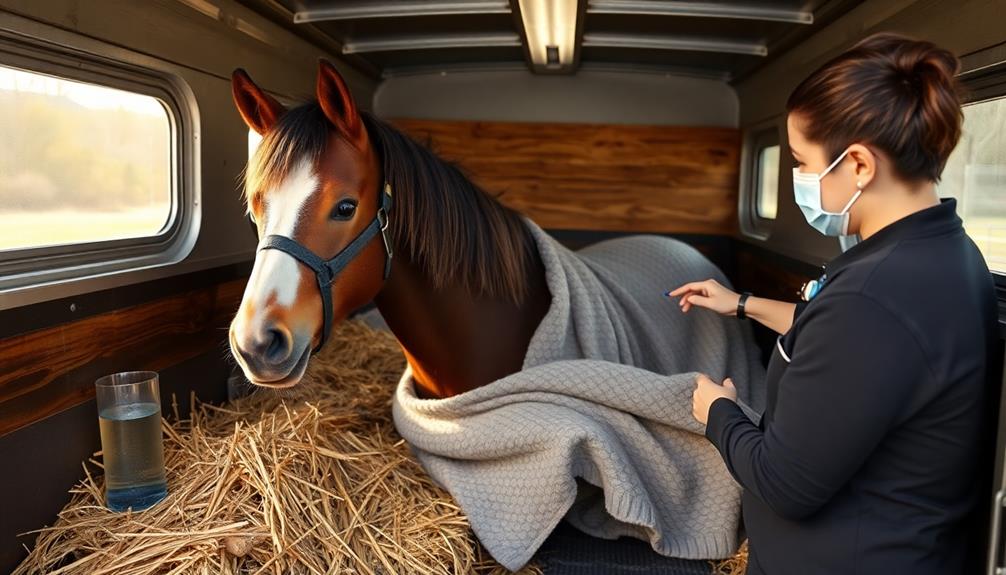
Confirming your mini horse's health before travel is vital for a safe and enjoyable journey. Schedule a veterinary check-up 1-2 weeks prior to your trip to verify your mini horse is healthy and vaccinations are up to date, including boosters for EHV-1, EIV, West Nile Virus, and Strangles.
You'll also need to obtain health certificates for interstate travel, as many states require them for entry.
Maintaining consistency in your mini horse's diet during transport is essential. Stick to their usual feed to minimize stress and gastrointestinal issues. If you plan to make any dietary changes, do so gradually well before travel to avoid colic.
Hydration is another key consideration. Monitor your horse's water intake before, during, and after the trip. Using concentrated electrolyte paste can help enhance their thirst before departure.
Once you've arrived at your destination, allow for acclimation. Ideally, give your mini horse one to three days to adjust while closely monitoring their eating, drinking, and behavior for any signs of heat stress or injury.
Taking these health considerations into account will help guarantee a smooth journey for both you and your mini horse.
Post-Travel Care and Recovery
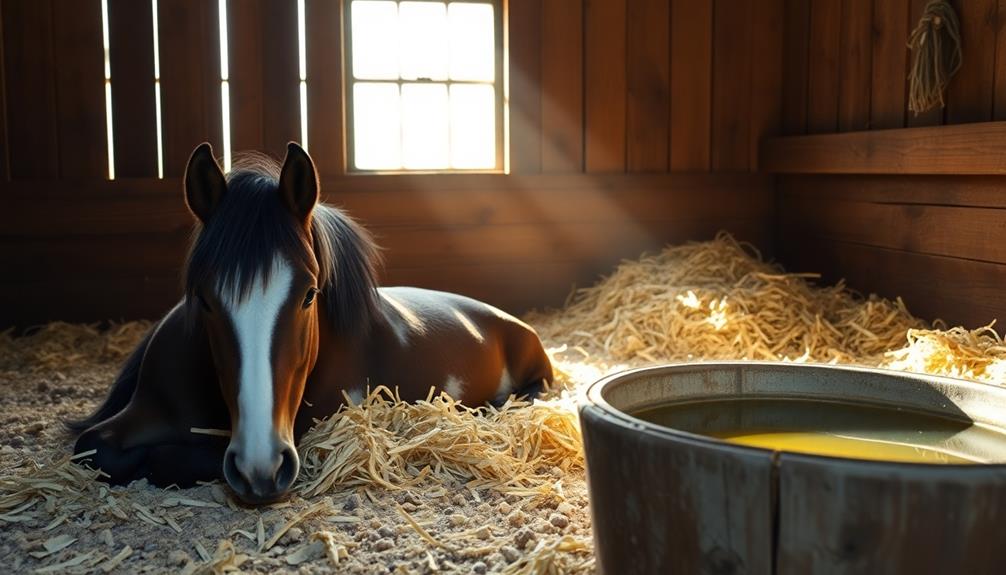
After transporting your mini horse, give them 1 to 3 days to adjust to their new surroundings.
Keep a close eye on their eating, drinking, and behavior, as any changes could signal stress or discomfort.
Providing fresh water and a comfortable environment will help them recover from the journey.
Health Monitoring Post-Travel
Once you've transported your mini horse, it's vital to keep an eye on its health to make certain of a smooth changeover.
Allow your horse 1 to 3 days to acclimate to its new environment, considering factors like temperature and altitude that can impact comfort. During this time, health monitoring is important; watch for any changes in eating, drinking, or behavior that could signal stress or health issues stemming from the journey.
Look out for signs of heat stress, such as excessive sweating or decreased energy levels. If you notice any abnormalities, address them promptly to prevent further complications.
Gradually reintroduce your mini horse to its normal feeding routine, ensuring it has access to fresh water and a comfortable resting area to help with recovery.
In the days following travel, keep a close watch on your horse's behavior and health. Early detection is key to addressing potential issues, so don't hesitate to consult a veterinarian if you notice anything unusual.
Recovery and Rest Periods
Often, mini horses need a proper recovery and rest period to adjust comfortably after travel. Upon arrival, give them one to three days for their recovery period, allowing them to acclimate to the new environment. Factors like heat and altitude can greatly affect their adjustment, so keep a close eye on them.
Immediately after unloading, make sure they've access to fresh water in a comfortable environment. Gradually reintroduce them to their normal feeding routine, as sudden changes can add to their stress.
Monitor their eating and drinking habits closely; any shifts in behavior could signal stress or potential health issues. During these first few days, regularly check for signs of heat stress, such as excessive sweating or decreased energy.
It's important to be vigilant for any signs of stress or injury, as these could indicate underlying problems. If you notice any abnormalities in behavior or health, don't hesitate to consult a veterinarian.
Community Insights and Resources

When it comes to transporting mini horses, tapping into community insights and resources can make a significant difference in your experience. Engaging with online forums and community groups lets you benefit from the shared knowledge of experienced horse owners. They often recommend loose hauling for short trips, as it tends to reduce stress and increase comfort for your mini horse.
Community members frequently emphasize the importance of acclimatization before travel. By introducing your mini horse to the trailer and surrounding environment gradually, you can help ease anxiety and guarantee a smoother journey. Proper handling techniques are vital, so make sure to learn from those who've successfully transported their mini horses.
Additionally, discussions highlight the significance of using proper equipment. Secure dividers and slip ties are fundamental for maintaining safety and preventing accidents during transport.
By connecting with others in the horse community, you'll discover tips and tricks that can enhance your transporting experience. This continuous exchange of knowledge fosters a supportive environment, enabling you to navigate the challenges of transporting mini horses more effectively.
Don't hesitate to ask questions and share your experiences—it's all part of being a responsible horse owner!
Frequently Asked Questions
Can You Transport a Mini Horse in a Car?
You can transport a mini horse in a car, but it's risky. Ascertain the horse's safety with proper harnessing, use a vehicle with partitions, and check insurance policies to avoid coverage issues during transport.
Can You Bring a Mini Horse on a Plane?
Yes, you can bring a mini horse on a plane, but you'll need to follow specific airline regulations, secure a suitable crate, and prepare your horse for the journey to guarantee a smooth experience.
What Is the Safest Way to Transport a Horse?
Imagine your horse standing calmly in a cozy trailer, secure and comfortable. To guarantee safety, use a proper trailer, tie them with slip ties, and take regular breaks for hydration and rest during travel.
How Often Should You Stop When Trailering a Horse?
You should stop every three to four hours when trailering a horse. This allows them to stretch, hydrate, and rest. Checking their condition during breaks helps guarantee their comfort and reduces stress during travel.
Conclusion
As you prepare to transport your mini horse, remember that every detail counts. Will your modifications hold up? Can you guarantee their comfort throughout the journey? As you drive, the weight of their well-being rests on your shoulders. But when you finally reach your destination, the sight of your mini horse stepping out, safe and sound, will make all the anxiety fade away. Will you be ready for the adventure that awaits? The journey isn't just about the destination—it's about the bond you share.
